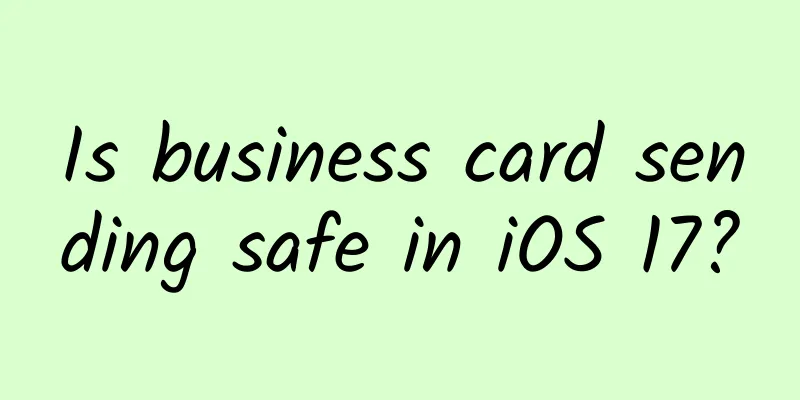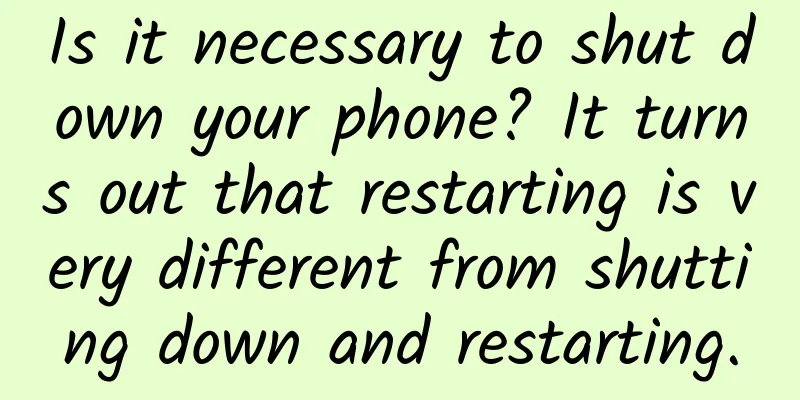Is business card sending safe in iOS 17?

|
Recently, many US law enforcement agencies and news media have repeatedly warned people that the new feature "NameDrop" released on iPhone devices poses security risks. This option of sharing contact information wirelessly may lead to the leakage of personal data. But the truth is, business card delivery is extremely safe, and warnings about the technology are overblown about its potential risks. Chester Wisniewski, a digital security expert at security company Sophos, said that the warnings about business card delivery are pure "alarmist nonsense." So people don't need to worry about business card delivery, but should be wary of these false propaganda spread by law enforcement agencies and news media. And unfortunately, this is not the first time that mainstream public opinion has made such a blunder. For example, despite warnings from law enforcement and others, there is no risk of safety from using public Wi-Fi or phone chargers in places like cafes and airports. And contrary to the dire conclusions recently issued by French regulators, there is no risk of radiation from our smartphones. There are indeed many risks and hidden dangers caused by technology in life, but just like the business card delivery incident this time, most of the time it is not worth wasting our energy on it. Below, we will understand the real situation of business card delivery. If you think this function is useless, you can also turn it off through the following method. How does business card delivery work and is it secure?Business card sending is a new feature recently launched by Apple for iOS 7. When we hold an Apple device and face other users, we may see a pop-up message asking whether we want to save the other person's contact information or share photos. This feature is slightly different from Apple's previous AirDrop feature, as some people have used AirDrop to send obscene photos to nearby strangers. AirDrop is suitable for Apple devices within a distance of about 9 meters from each other, and requires both phones to have Wi-Fi and Bluetooth turned on at the same time. But according to Apple, business card sending requires the two Apple devices to be several centimeters apart to be effective, which means they almost have to be close to each other. In addition, both devices need to be unlocked before business card sending can be used, and the user actively selects the contact information to be shared. So the only risk is theoretical: the scammer is already in our face, and we mistakenly agree to share our contact information with the other party. That's the only possibility, and the probability of accidentally leaking information is zero. So why did law enforcement agencies in Pennsylvania, Ohio, Oklahoma, and elsewhere publish similar messages on Facebook, hyping up the privacy risks of business card delivery? To be honest, I have no idea. If you still have doubts, or think you will rarely use this feature, you can turn it off in the following way. Of course, this worry is obviously unnecessary. To turn off business card delivery, tap the "Settings" app on your iPhone, then tap "General" - "AirDrop" - then turn off the switch for "Bring devices close together" (when turned off, the button will turn from green to gray). You can also restart business card delivery at any time through this step to easily share your phone number, email address or photo with new friends. In fact, business card sending is an upgrade of the AirDrop function, and its switch option is also under the AirDrop settings, but AirDrop can be used to transmit various information such as pictures and URLs, so instead of worrying about the risks of business card sending, it is better to think about how to use AirDrop safely. When using this feature, the wisest thing to do is to set AirDrop to "Do not receive" or "Contacts only", which can reduce the risk of accidentally receiving photos or files from strangers around you. Fear-mongering poses risks of its ownMany people live in constant fear of technological risks, and much of the responsibility lies with government agencies and the news media, which often exaggerate and make things seem more terrifying than they actually are. I believe many people have heard of the so-called "juice hijacking". Law enforcement agencies use this term to describe criminals implanting software into mobile phone chargers, causing ordinary users to suffer personal data leakage when charging for free in shopping malls, airports, etc. Indeed, if you are doing special work or are a target of possible surveillance, you should not use free chargers in public places. But if we think about it, we can see how difficult it would be for hackers to do this. They would have to go to the airport or shopping mall in person and perform some sophisticated modifications on the mobile phone charger. In fact, there are many simpler and safer ways to steal the personal information of ordinary people. A few months ago, a concerned reader emailed me asking if there were any risks in swiping your credit card in a store. As with juicejacking, the risk is real, but few criminals are willing to risk being in the spotlight and stealing your credit card details in person. Again, while the theoretical risk is real, real-life crime is pretty mundane and not as thrilling as a James Bond movie. Why would they risk their lives when there are easier ways to steal credit card information? We all live in the real world, and our limited energy cannot and should not be wasted on all kinds of unnecessary threats. So what we need to worry about is not the business card delivery, but some official departments and news media that have considerable influence but always speak without hesitation. |
<<: A must-have file search tool for your computer, better than Everything
Recommend
The most complete guide to live streaming sales: KOL placement strategy!
The framework is as follows: 1. What is the real ...
Baoneng emerges as buyer of Pangda in crisis
Following Evergrande's 14.5 billion yuan inve...
Once again brought back childhood memories. Complete TV version of "Balala the Fairies" game experience
Previously, the review room had tried out the TV ...
Financial industry event planning program
Without further ado, let's get straight to th...
Should I upgrade to iOS 13.6.2 after Apple pushes it? If my phone still works, I suggest not to upgrade.
Not long ago, Apple pushed the iOS 13.5.1Beta ver...
How much does it cost to be an agent for a homestay mini program in Hengshui?
Why should you be an agent for WeChat Mini Progra...
Born for smart home, ZIVOO smart box offers a comprehensive experience
The original intention of the TV box was to make ...
Why is sepsis so likely to kill people? Six facts you must know
Speaking of "sepsis", you may feel unfa...
4 tips and 6 taboos for live streaming sales
As a short video platform with more than 600 mill...
How to guide users to create content from 0 to 1?
1. What did Lukou Community do from 0 to 1? Lukou...
Known as the "giant panda of the sea", is it the only whale named after China?
Among the 93 species of cetaceans in the world, t...
Can Dong Mingzhu's Gree washing machine break the Gree mobile phone curse?
Just as the hype about Gree mobile phones died do...
Astronauts can turn around by just swinging their arms, but what about satellites without arms?
On December 9, 2021, "space teachers" Z...
Priced from RMB 289,800, the first model of Fangcheng Bao Automobile, Bao 5, is officially launched and will start delivery in November
On November 9, the first model of Fangcheng Bao A...
Is the era of the app factory over? Why are there fewer and fewer new apps?
In the past few years, if you were to ask what tr...









